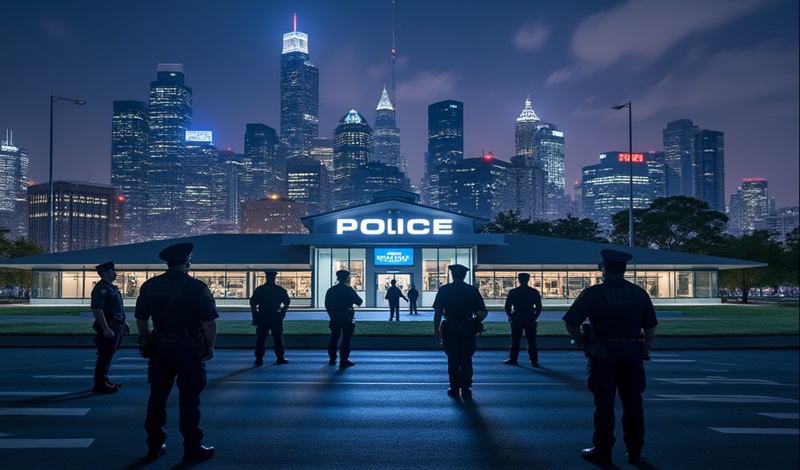
Federal consent decrees imposed on local police departments are court enforced rules initiated by the federal government, typically the U.S. Department of Justice (DOJ), after an allegation of misconduct. The court appoints a monitor who reports on compliance to the court. The court decides when, if ever, the department is released from federal oversight.
The Los Angeles Police Department, Albuquerque Police Department, Pittsburgh Bureau of Police, Chicago Police Department, Baltimore Police Department, New Orleans Police Department, Seattle Police Department, Springfield, Massachusetts Police Department, Louisville Metro Police Department, Ferguson, Missouri Police Department, Newark, New Jersey Police Department, Cleveland Division of Police, and the Portland Police Bureau all have been or are currently under the federal thumb of a court ordered consent decree.
What do surveys of citizens reveal about what they want from policing?
- Visible Presence of Police: More visible police patrols, especially in areas perceived as high-crime or unsafe, suggesting that visibility of law enforcement can act as a deterrent to crime.
- Response Time to Calls: Quick response times to emergency calls are a significant concern. The public often rates the effectiveness of police services based on how swiftly officers react to incidents.
- Crime Prevention: People want assurance that the police are proactive in preventing crime, not just reactive. This includes initiatives like traffic stops, stop & frisk, and neighborhood watch programs.
- Interaction with Youth and Schools: Providing safety through School Resource Officers (SROs).
- Public Safety Education: Education on crime prevention, safety tips, and how to respond in various situations (like active shooter scenarios or home invasions) reflecting a desire for community empowerment in safety matters.
Yet, despite those issues being what people care about, none of those are areas of concern to federal consent decrees.
Instead, consent decrees are an intrusive tool that undermines local law enforcement, erodes public safety, and disregards the will of local communities.
Consent decrees are purportedly a way for the Department of Justice to address complaints about law enforcement agencies. But what began as targeted interventions has metastasized into heavy-handed, bureaucratic oversight that saps resources, stifles police effectiveness, and overrides community standards. Consent decrees have turned into a straitjackets, limiting the police force’s ability to respond effectively to crime and protect residents.
As crime rates have surged, with violent crime afflicting residents at levels unseen in decades, consent decrees have imposed rigid restrictions on police practices, creating a culture of risk aversion that hampers officers from taking necessary actions. The decree’s guidelines and requirements have led to police disengagement, as officers find themselves shackled by complex and often impractical rules designed more to appease distant bureaucrats than to serve the immediate needs of residents.
The intense oversight and regulatory mandates have created a “stand-down” culture, where police officers avoid engaging with the public for fear of reprisal or bureaucratic retribution. Policing is a profession that requires initiative, quick decision-making, and a willingness to step into danger to protect the innocent. But under the watchful eye of federal overseers, officers are often unable to fulfill these duties without hesitation, second-guessing, and fear of punishment. As a result, police presence in high-crime areas has diminished, creating a vacuum readily filled by criminal elements.
The financial burden of these decrees is another unaddressed problem. Compliance with federal consent decrees is costly, requiring substantial investments in monitoring, and administrative oversight. These funds, often directed toward consultants and compliance officers, could instead be invested in expanding police forces, and improving community policing programs. The cost of compliance diverts resources from essential services and strains the city’s already tight budget. Federal intervention is not cheap, and cities struggling with high crime rates and limited funds can ill afford to divert resources from community needs to meet bureaucratic requirements.
A further issue with consent decrees is their lack of transparency and accountability to the communities they supposedly serve. Federal bureaucrats make decisions and set priorities without consulting the local populace. As a result, citizens who wish to see stronger police enforcement in their neighborhoods are effectively silenced by a system that prioritizes distant, abstract standards over the concrete needs of residents. The federal overseers are not elected, nor are they accountable to the people. This setup denies the democratic right of local communities to determine how they are policed, a troubling inversion of democratic principles.
In the face of surging crime rates, diminishing police morale, and local frustration, it’s time to terminate the use of consent decrees. People need policing that is adaptable, responsive, and attuned to local values and concerns—not bound by the dictates of federal overseers. Consent decrees have proven to be both ineffective and counterproductive, introducing a culture of bureaucratic oversight that often blinds itself to the harsh realities on the ground. Cities laboring under consent decrees, are not safer because of federal intervention; they are more dangerous.
Our police officers deserve the freedom to do their jobs without the ever-present fear of bureaucratic reprisal. Local communities deserve the right to control their own safety measures and determine how best to address crime and public disorder. As it stands, consent decrees have become a roadblock to justice, safety, and the principles of local self-governance. Ending them is not only reasonable but essential if we are to restore safety and sovereignty to America’s cities.